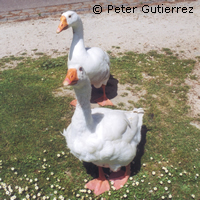New cases of bird flu found in Europe
Austria and Germany have become the latest countries to announce the detection of avian influenza within their borders, bringing the number of EU Member States affected to four. The H5 avian influenza virus has been found in dead swans in Mellach in southeast Austria, and on the German island of Rügen in the Baltic Sea. While it is suspected that the birds were infected with the highly infectious H5N1 virus, this is yet to be confirmed. Tests are being carried out in a specialised laboratory in the UK. The H5N1 strain has been found in Italy, Greece and Bulgaria in recent days. Countries around Europe are now looking again at their provisions for protecting poultry and local birds from the disease amid warnings that it may spread when migrating birds return from Africa in the coming months. 'In view of the fact that the virus seems to be circulating quite widely in Africa where our migratory birds go to spend winter, we might say there is a risk for Europe in the coming spring,' Samuel Jutzi, director of the animal production and health division of the UN's Food and Agriculture Organisation has told journalists. Northern Nigeria, where the pathogenic H5N1 strain has been found, is where many birds from Europe spend the winter. The real danger is that the disease will be passed on to humans through contact with poultry. The H5N1 strain has killed at least 90 people since early 2003, mostly in South East Asia. Under the EU's Fifth Framework Programme for Research (FP5) some six million euro was spent on research into avian and pandemic influenza. The funding was divided between 22 institutions and national reference laboratories across eight European countries. Under FP6, activities were extended with a set of new projects launched in both the animal and human health sectors, and with a more than three-fold increase in the EU contribution (16 million euro plus funding for two large Networks of Excellence and an Integrated Project). To date, a total of over 120 laboratories across 21 European countries have thus received funding for research on influenza within the Framework Programmes. The EU pledged 200 million euro for the fight against bird flu at an international donor conference in Beijing, China, in January. Announcing the contribution, Austria's Minister for Health Maria Rauch-Kallat also said that Austria will set aside one million euro for measures to tackle avian flu, in particular for the establishment and upgrading of veterinary and human medical diagnostic centres in affected areas.
Countries
Austria, Bulgaria, Germany, Greece, Italy



